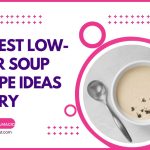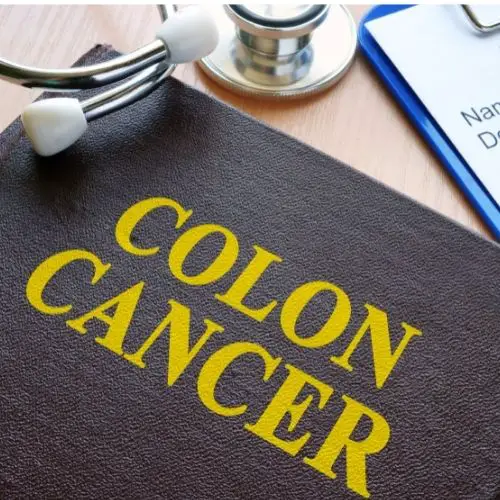Can You Eat Pizza After Colonoscopy? And When?
Quick summary:
Eating pizza after a colonoscopy is allowed if you don’t have troublesome symptoms such as bloating or vomiting. But eating soft, easy-to-digest food on the first day after a colonoscopy is better.
Don’t eat pizza with severe bloating, nausea, diarrhea, or vomiting. Also, Avoid it if you had a polypectomy (removal of a colon polyp) or biopsy.
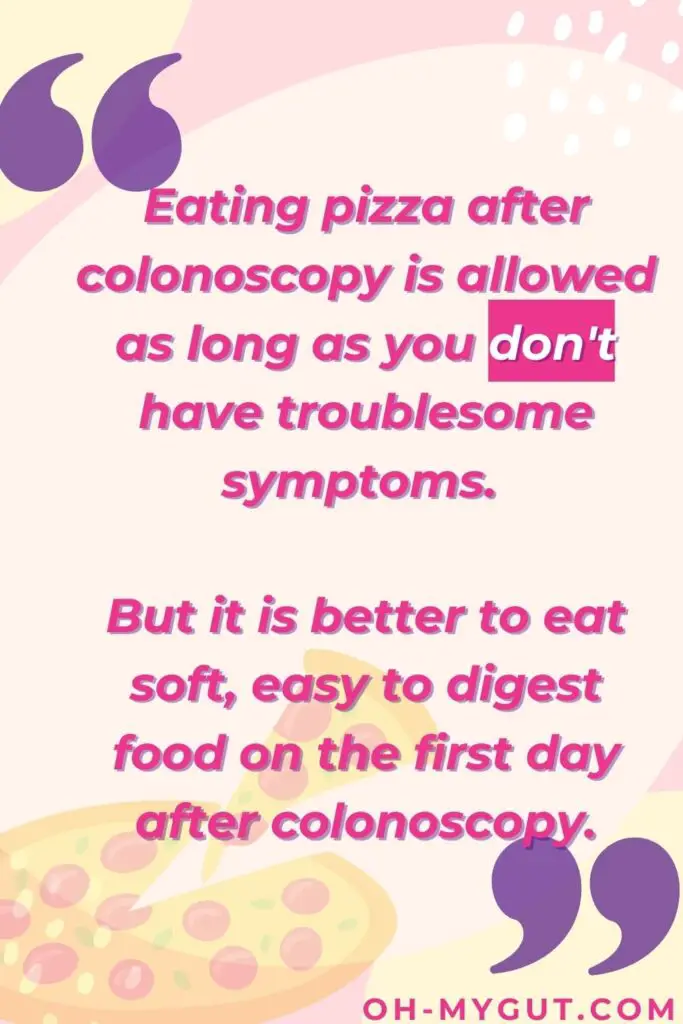
When is it ok to eat pizza after a colonoscopy?
Although colonoscopy itself is a safe procedure, preparations for colonoscopy are exhausting and dehydrating.
Basically, you can eat safely after your colonoscopy unless your doctor limits the consumption of certain foods.
But, it Better to stay on soft and high fiber food after colonoscopy and postpone fried food and high-fat food such as pizza to the next day after colonoscopy.
If it is necessary, you can eat pizza the same day after colonoscopy provided that:
- Your colonoscopy didn’t include polypectomy (removal of a polyp) or biopsy.
- You don’t feel bloated or have abdominal pain.
- You don’t have reddish or blackish Blood in your stool.
- You’re not a diverticulosis patient.
When NOT to eat pizza after a colonoscopy?
Sometimes, It is better to avoid eating pizzas and fried foods for 24-48 hours after colonoscopy. This is particularly important when:
- You have bloating or distension.
- Your doctor removed a polyp or took a biopsy.
- You pass an abnormal amount of red blood or Black stool.
- You have severe diarrhea or abdominal pain.
- You have vomiting or severe nausea.
What is the best time to eat pizza after colonoscopy?
No absolute best time that fits all conditions. If you have no issues or symptoms after your colonoscopy, you can eat pizza preferably 6 hours after the procedure.
But if you have Bloating, pain, or performed polypectomy or Biopsy, you shout delay eating pizzas for 1-2 days.
Generally speaking, colonoscopy is a safe procedure, unless your doctor have a special precaution, you can eat safely.
Tips to safely eat pizzas after colonoscopy:
1- Don’t eat too much pizza.
To avoid colic and bloating, don’t eat excessive amounts of pizzas. Colon preparation and the colonoscopy procedure itself are exhausting to your gut tract.
Overfeeding (especially with high-fat foods like pizzas) can worsen your symptoms.
So, try to order a smaller size or eat less than the regular amount you normally eat.
MORE: Bloating after Colonoscopy.
2. Eat the right type of pizza.
Avoid high-fat pizzas and stick to low-fat and less spicy pizzas.
Avoid pizzas containing more tomatoes, processed meat, or seeds.
Steer clear of fatty sausages and pepperoni, extra cheese, creamy sauces, and stuffed crusts to save on the amount of fat
3- Drink plenty of fluid.
This is very important to correct the dehydration from the Colon prep. Also, it helps Bowel movement after colonoscopy.
Examples of drinks:
- water
- fruit juice
- vegetable juice
- soup.
4- Also, eat soft and high Water foods.
Adding other foods that can help your Bowel movement is a good idea.
Not only eating fast foods and processed meat which is not good for your colon health in the long term. Try easier foods (especially The day after colonoscopy) such as: –
– Soup.
– Scrambled eggs.
– Tender, cooked vegetables.
– Yogurt
– Mashed potatoes.
-Jell-O
– Popsicles.
– Pudding.
A final word from oh-mygut.com
If you want better gut health, and you want to avoid dangerous diseases as colon cancer, stop eating fast food.
According to this 2018 study, Eating pizzas once a week raises the odds of getting Colon cancer 300 %.
Common foods associated with colon cancer (ref)
- Red Meat.
- processed meat: smoked, canned, or salted meat.
- Alcohols: One drink every now and then may not affect your colon, But regular 2 to? drinks can raise your chances of getting colon cancer.
Stay healthy, strategically eat foods that promote your gut health and prevent colon cancer in the long term such as:
- Dairy products that are rich in calcium.
- Whole grains: packed with nutrients and soluble fiber, and helps your colon keep moving, and removes compounds that may cause cancer.
- Beans and legumes: packed with fiber and vitamin B complex.
- Colored fruits: they contain natural substances (phytochemicals) that may block the growth of cancer cells or fight inflammation.
- Fish: containing Omega-3 fatty acid that fights gut cancers and supports heart health.





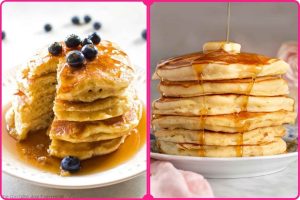


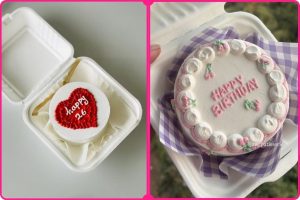



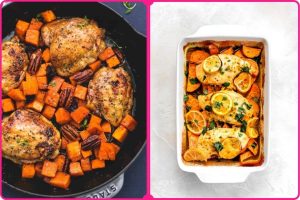
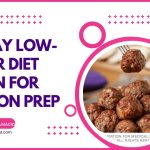
![8 Tips To Avoid Vomiting & Nausea During Colonoscopy Prep. [Dr. Farahat] Tips to avoid vomiting during colonoscopy PRep.](https://www.oh-mygut.com/wp-content/uploads/2024/08/Tips-to-avoid-vomiting-during-colonoscopy-PRep-150x150.jpg)


